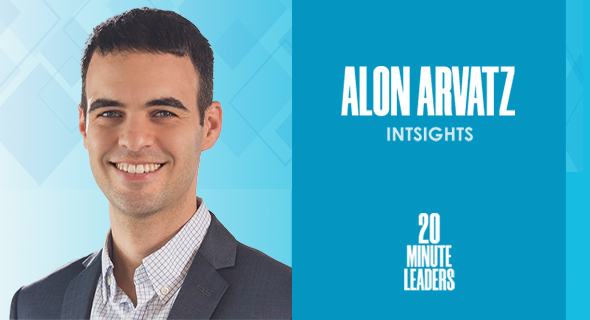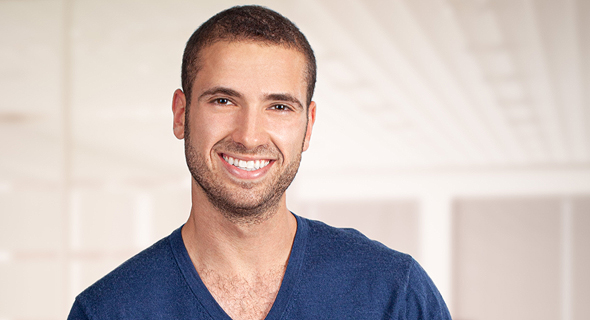“This is why I wake up in the morning: to create things that didn't exist before.”
Creating new things is what drives Alon Arvatz, co-founder of IntSights and currently senior director of product management at Rapid7
Creating new things is what drives Alon Arvatz, co-founder of IntSights and currently senior director of product management at Rapid7. His passion to build things and help society can be seen in his first ventures, Cyber-School and financial literacy organization Kanfey Kesef. Arvatz shares that these experiences gave him confidence to start IntSights. With the right team, he found success, though the road was not without conflict. He explains that even when arguments arose with his co-founders, they realized they had to work together to grow the company, and they were able to set conflicts aside. IntSights experienced rapid growth, which created new obstacles as the team expanded. Arvatz says keeping everyone in alignment while allowing executives independence to lead their teams was a big challenge, and communication had to adjust. He advises entrepreneurs to trust their common sense and knowledge of their company as they face big decisions.
Click Here For More 20MinuteLeaders
Who is Alon in your mind?
Something that is very basic with everything I do and all of my various experiences is my passion and love for creation, creating something new that didn't exist before. That's what drives me every day: building something new, making it better, contributing to society.
It started at a very young age. When I was in high school, I looked for new ventures and new initiatives. It also went with me after my military service, when I founded Cyber-School, a company for cybersecurity training.
What was the motivation there?
Cyber-School was combining two very big passions: education and cybersecurity. Cyber-School was really combining these into one place and one initiative.
I think what really sparked it was when my co-founder, Guy, was on a trip to Northern Israel and he met a family there. They said, “We wish that our son would also study cybersecurity." This is the point where we realized that there is a very, very big need in the market. We can be the ones to bring a solution and help teenagers and their parents get to know cybersecurity.
Then you went to start Kanfey Kesef, talking about financial literacy.
The financial literacy actually came from the university. So in university, I studied accounting. I just felt that the things I learned in the first few weeks of accounting is something that anyone should know. I said, "I have to create some organization that would bring this knowledge to teenagers and allow them to manage their money a lot better."

If you grouped Cyber-School and Kanfey Kesef together, how do you look back on those experiences?
I used to say that Kanfey Kesef and Cyber-School were my MBA. I had no idea of what business is, what founding a company is, how you sell something, how you work with customers. These were ways for me to jump into the water and get into building a company. That is actually what gave me a lot of the confidence and skills to later on found IntSights.
Share the founding story of IntSights. Then I'd love to unpack your personal journey there.
We had an extremely naive beginning for IntSights. We identified the problem. Back then, consuming intelligence about threats and potential attacks was a manual process, hard to consume, never on time. We wanted to bridge this gap with technology and a product that would help you consume that a lot easier.
We just found the team, started developing the product, and started approaching customers. One day, someone said, "Why don't you raise capital? I can connect you to someone." We just came for a pitch with no presentation and started talking with Glilot Capital.
Paint me the picture of you sitting in this meeting with Glilot. What is that experience like for you and the team?
Honestly, it was mainly scary. Think of me as a person that didn't come from even the high-tech industry. Coming to investors and telling them, "I want you to give me $2 million," that was, for me, unheard of. We were really doing it on the tip of our toes, step by step trying to figure out what to do next, what should we say.
Looking back at IntSights, what experiences jump out at you that you’ll take with you forever?
I always say that when you're a startup in hyper growth, every quarter, it's a different company. When we started IntSights, it was about building the product. Then it was about being able to sell it. Then it was about managing existing customers. Every step of the way, it was something completely different. All these phases, each of them built me and built another layer of my personality.
Probably my biggest challenge was when we became a relatively big company, almost 200 employees and we had over 10 executives all across the globe. Creating alignment between all these executives and teams, that's been a huge challenge. I think that in many ways, my journey is the story of IntSights.
What adjustments did you have to make as you were changing your personal position and thinking process?
I think that the most important tool and the most important tip that I have to give entrepreneurs is trust your judgment. Common sense is your most important tool in your toolbox. Be open to change. Try to understand the reality. And then trust your common sense. You are a smart person. You know the business best.
I can remember a situation, where I stood, who I talked to on the phone, when I had to make a big decision and I made it. But in my mind, I was saying to myself, "You've never done it before. How can you trust your judgment?"
What surprised you about growing from 3 or 5 people to 200 people?
I think it really goes back to the alignment. When you're a young startup, alignment is a non-issue. Everyone sits in the same room, and they talk all the time.
I think something that really surprised me is the importance of alignment and communication. When you grow big, you have to communicate all the time about what you do and why you do it. If you don't do that, then suddenly the company starts to split into different directions.
It's not the same level of communication that you have with your leadership team as with the entire company. You now communicate with 200 people. But you also have more executives who then need to align the different segments of the company.
Exactly. And executives have opinions. They are tasked to lead strategy. We trust them to do that. There is an inherent conflict of everyone going the same direction and at the same time having independence and leading their team. So it becomes a lot more complicated when it becomes big.
If you're looking back at some of the toughest times you had at IntSights, where did you derive your personal inspiration from? Who did you turn to?
Every time I come into this situation, I really hang on to my co-founders. Every time that I felt like, "It will be impossible," I had one of my co-founders telling me a success story. Every time that one of us had this situation that was extremely challenging, having the other person telling me, "From my point of view, things are good. I see the light," that’s really what gives me strength.
Did that relationship and that intimacy stay throughout the seven years?
I think we're as good friends as we started. We have a very, very good relationship. But I can tell you that throughout the journey, it's ups and downs. So it's not the same level all the time.
I think the secret, at least for us, was that every time we had a conflict, every time we argued, every time we even screamed at each other, the day later, we all knew we needed to continue to make this work. We need to continue together because the success of this company depends on us.
If you were to think of a few words to describe yourself, what would they be?
The first one would be relentless. I face challenges all the time, but I always continue with my goals. Optimistic. I believe that things will work, that the end will be good. And builder or creator. This is why I wake up in the morning: to build new things, to create things that didn't exist before.

Michael Matias, Forbes 30 Under 30, is the author of Age is Only an Int: Lessons I Learned as a Young Entrepreneur. He studies Artificial Intelligence at Stanford University, is a Venture Partner at J-Ventures and was an engineer at Hippo Insurance. Matias previously served as an officer in the 8200 unit. 20MinuteLeaders is a tech entrepreneurship interview series featuring one-on-one interviews with fascinating founders, innovators and thought leaders sharing their journeys and experiences.
Contributing editors: Michael Matias, Megan Ryan



